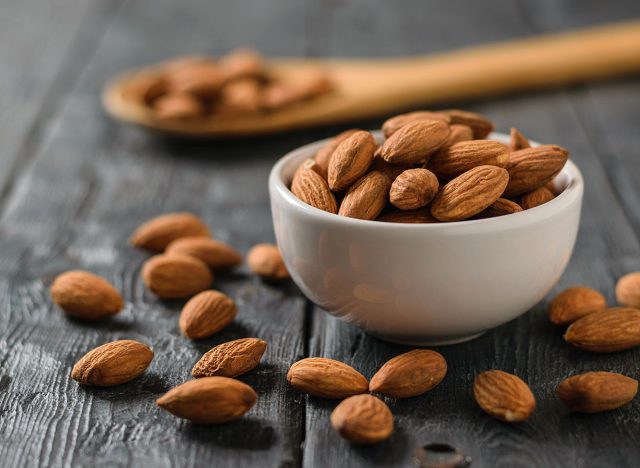The #1 Best Nut To Feel Stronger While Exercising, Says Science

While many athletes are used to constantly eating right and training to their full potential, there are still times in the gym or out on a field where it feels like a challenge to be a top performer. This week's sprints are slower than the week before. The weights aren't lifting off the ground as smooth as butter. Maybe it's just a hiccup or just an off day. Another possibility: maybe these athletes need to be including one more simple food into their diet that could help boost their abilities and talent: almonds.
A 2014 study in the Journal of the International Society of Sports Nutrition found that almonds can have a positive impact on athletes and their performance during a workout.
How almonds affect exercise performance

The research looked at eight male competitive athletes who were randomly given either 75 grams of whole almonds per day or 75 grams of isocaloric cookies per day. The subjects consumed one assigned food for four weeks, then were switched to the alternative for another four weeks to evaluate if the almonds could play a role in a stronger workout.
At the end of each four-week period, the athletes were given a three-exercise physical circuit test—including a 10 minute warm-up of cycling at 30% max speed, straight into 115 minutes of steady cycling at 50-60% max speed, followed by 20 minutes of all-out effort cycling—which showed that the introduction of almonds to their daily diet improved both their physical performance and their individual endurance levels throughout the workout.
Almonds are loaded with antioxidants, healthy fats, plant-based protein, and dietary fiber. The protein and fiber nutrients in almonds help the body feel fuller for longer, which may also explain why an athlete's endurance could last longer during a workout. Plus, researchers discovered that the antioxidants in almonds contributed to better oxygen flow to the body's muscles and airways, due to the antioxidants improving the body's breakdown of glucose.
The caveats
Unfortunately, while almonds are filled with a big handful of good nutrients, there are a few holes and bias factors in this study to consider. For starters, the participants were highly trained athletes and continued their regular three to five hours of off-season training at least five to six times a week during the entirety of the study. Also, the researchers used cookies in comparison to almonds; Even though both foods may have had the same calories, they do not share the same nutrition breakdown.
Almonds can be beneficial to the body and in an overall healthy diet, but "[the nut] alone does not typically have a direct impact on workout endurance," according to registered sports dietitian and Medical Board Member, Amy Goodson, MS, RD, CSSD, LD. For athletes most specifically, she recommends a "carbohydrate is the main source of and preferred source of, fuel for exercise, especially higher intensity exercise."
Goodson explains that it's important to take note of the good healthy fats when consuming almonds, but "in sports nutrition we actually do not recommend high-fat foods immediately pre- or post-workout."
How to eat almonds for a better workout
There is still much more research to be done on the effects of almonds and athletes' physical performance. However, on average, if you eat almonds within a meal 2-4 hours before the workout then you will likely still have a great workout, Goodson says, especially "if consumed with a meal containing complex carbohydrate and lean protein."









